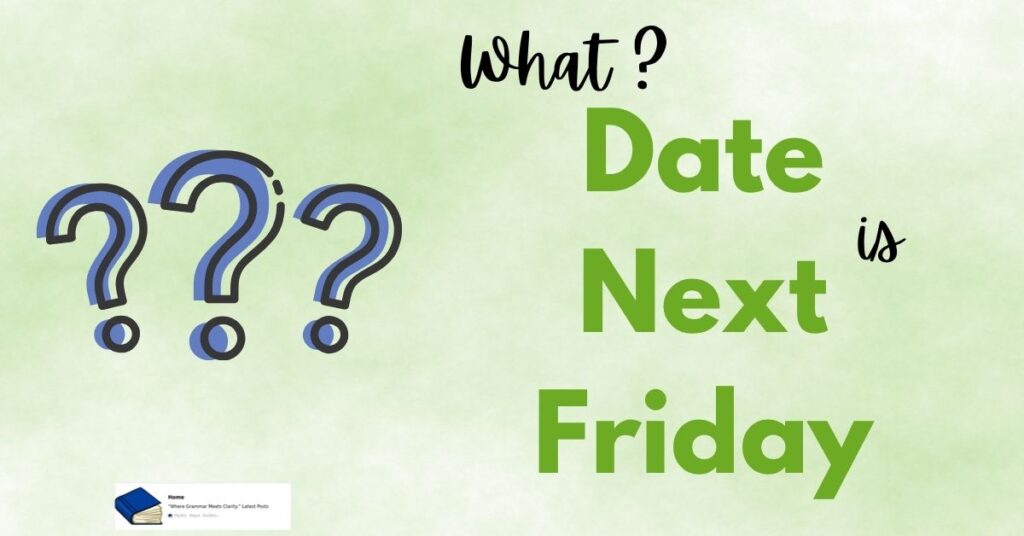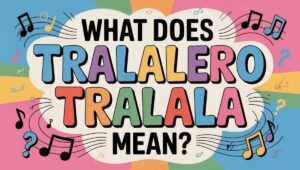We’ve all been there: someone says, “Let’s meet next Friday,” and you’re left wondering… Do they mean this week’s Friday or the one after that? If your mind instantly launches into a frantic mental calendar check, you’re not alone.
The difference between “next Friday” and “this Friday” has triggered missed meetings, double bookings, and countless arguments especially in texts or quick conversations.
This complete guide will clear things up once and for all.
Why “Next Friday” and “This Friday” Are So Confusing
Let’s start with the problem: calendar confusion. Unlike specific phrases like “July 5th” or “Friday, the 10th,” terms like “next Friday” are relative. That means their meaning shifts based on context, speaker, location, and timing.
For example, if it’s Monday, and someone says “this Friday,” most people assume it means the upcoming Friday of this week. But if they say “next Friday”? That’s where things split:
- In the United States, many people interpret “next Friday” to mean not this coming Friday, but the one after so, a full 11 days from today.
- In countries like the United Kingdom or Australia, however, “next Friday” is often used to mean the very next upcoming Friday, no matter what day it is.
That’s how regional language differences add another layer of calendar scheduling chaos.
The Core Difference: This vs. Next
This Friday
Refers to the Friday of the current week. So if it’s Monday through Thursday, “this Friday” is just a few days away.
Example:
Today is Tuesday. “This Friday” = 3 days from now.
Next Friday
Generally refers to the Friday of the following week, not the upcoming one though again, this can vary.
Example:
Today is Tuesday. “Next Friday” = 10 days from now.
So, When Is Next Friday? (With Examples)

Let’s break it down with scenarios so the difference becomes crystal clear.
Example 1: Email from a coworker
“Hi Michelle, let’s finalize the report by next Friday.”Today is Wednesday, July 3.
Is the next Friday date July 5 or July 12?
Answer: Most Americans would interpret that as Friday, July 12 not this week’s Friday but the one after.
Example 2: Text message from a friend
“Want to hang out next Friday?”Today is Sunday.
If you’re in the UK or Australia, your friend probably means the upcoming Friday just five days from now.
But if you’re in the United States, they likely mean Friday of next week, which is 12 days away.
So… what date is next Friday? That depends on where you are and how the person defines “next.”
The “Seven Days Rule” to Clarify Scheduling
A good trick to remember is the “seven days rule.”
If the date next Friday is 7 or more days away, many people will say “next Friday.”
If it’s within the same week, people tend to say “this Friday.”
But don’t count on that rule 100%. People don’t always stick to it.
Context is Everything
Here’s where the plot thickens. Context in communication changes everything.
Casual Conversations:
“Let’s watch that new movie next Friday.”
The speaker might not specify the date. Unless you clarify, you could show up on the wrong day.
Work Settings:
“We need the pitch deck submitted by next Friday.”
Here, the stakes are higher. In professional communication, it’s always safer to include the date.
Say this instead:
“Let’s meet next Friday, July 12.”
or
“Can you send the file by Friday, the 5th?”
That one simple change eliminates misunderstanding.
How Digital Calendars Can Trip You Up

Even digital tools can’t agree!
Some calendar apps show “next Friday” as the very next one others assume it’s the Friday of next week. So when you’re creating event planning invites or managing Friday deadlines, always spell out the exact date next Friday falls on.
Better Phrasing to Avoid Time Phrase Confusion
Here’s how to clarify your schedule and eliminate uncertainty:
| Ambiguous Phrase | Better Option |
|---|---|
| Let’s meet next Friday | Let’s meet Friday, July 12 |
| Deadline is next Friday | Deadline is Friday, July 12 by 5 PM |
| Party this Friday | Party this Friday, July 5 |
| Call me next Friday | Call me Friday after this, July 12 |
Remember: clarity trumps cleverness. Don’t assume others interpret time the same way you do.
Why This Matters (More Than You Think)
In a world filled with project deadlines, event coordination, and work-from-home calendars, small scheduling misunderstandings can cause big problems:
- Missed meetings
- Canceled plans
- Delayed work
- Embarrassed apologies
By learning how to clarify time references, you save yourself and others from these awkward hiccups.
Real-World Example: A Professional Slip-Up
Let’s say your boss, Muhammad Saeed, sends an email:
“We’ll have the client demo ready by next Friday.”
You assume that means the end of this week. But your boss meant the Friday after.
Now you’re scrambling to finish everything a week early all because of one unclear phrase.
Regional Language Differences Around the World
Different English-speaking regions have different standards:
- United States:
“Next Friday” = The Friday after this week - United Kingdom & Australia:
“Next Friday” = The upcoming Friday - New Zealand:
Similar to UK; “next Friday” often means the nearest one.
That’s why phrases like “next Friday vs. this Friday” often trip up international teams or remote workers.
FAQ’s
🕵️♂️ What does “next Friday” mean?
Usually, the Friday of next week, but context matters.
📆 What date is next Friday?
If today is Wednesday, July 3, then “next Friday” is usually Friday, July 12.
❓ What is the date next Friday?
Refer to your calendar, count 10–11 days ahead, and confirm with the person!
📅 When is next Friday?
Count from today to the Friday of the following week but always ask!
Tips to Avoid Friday Confusion Forever
- Always include the exact date.
Say: “Friday, July 12” instead of “next Friday.” - Ask for clarification.
It’s better to ask now than show up at the wrong time. - Use calendar invites.
They keep everyone on the same page literally. - Be extra clear in professional emails or event planning.
- Avoid assumptions based on region.
English is full of sliding calendar scales, so play it safe.
Conclusion
Next Friday or this Friday it might sound like a small issue, but it’s one that can derail plans, delay projects, and stir up confusion fast.
Understanding the Friday difference, especially in a world of international work and instant messaging, is more than helpful it’s essential.
So next time you wonder, “What does next Friday mean?” pause, clarify, and maybe ask:
“What’s the exact date you mean?”
Your calendar and your sanity will thank you.









